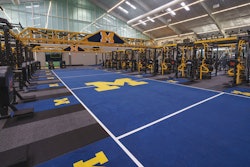Copyright 2018 Collier County Publishing Company
All Rights Reserved
Naples Daily News (Florida)
I once saw a Facebook post that said "Exercise is the most under prescribed antidepressant."
If you're not familiar with depression, it is a debilitating condition characterized by negative feelings of self-worth, guilt, sleep pattern changes, changes in appetite, energy and more. It affects approximately 16.2 million American adults and more than over 2.8 million teens each year, and women suffer almost twice the incidence of depression compared to men. However, due to lack of resources or social stigma, less than half of those diagnosed access treatment, making the role of exercise even more pivotal as an alternative therapy.
Clearly I am not a psychologist and do not make any claims therein, but the growing body of evidence supporting the benefits of exercise in reducing depressive symptoms cannot be denied. It is clear that exercise should be prescribed as a complimentary therapy alongside psychological and pharmacological treatments for mood disorders.
There are a number of mechanisms proposed to explain the anti-depressive effects of exercise. One group of research suggests that the body's physiological response to exercise is to secrete chemicals called endorphins which affects a person's mood and reduces the perception of pain in the brain.
Additional research shows that the benefit of exercise comes from the fact that it stimulates the growth of neurons in the hippocampus. The hippocampus is the portion of the brain believed to be responsible for memory and emotion. Stimulating neuron growth can mean a greater capacity for both memory and emotion. Understanding the function of the hippocampus makes it easy to understand why increasing the prevalence of neurons will have a positive effect on mood. It also helps explain the continuing research correlating exercise and the prevention or delay of neurological diseases such as Alzheimer's.
Exercise recommendations and program design are not markedly different for people with depression verse those of the general population. As a guide, programs should include moderate intensity aerobic exercise performed 5 times a week for 30 minutes per session. Individuals who adhere to these guidelines for a 10-week period are both more likely to be effective in treating symptoms of depression and prevent future depressive episodes.
The one area of discrepancy is with regard to strength training. While the evidence for aerobic exercise is quite clear and easily confirmed through the increased amounts of endorphins in the brain and the measured growth of neurons in the hippocampus, evidence for resistance training is less established. This in no way suggests that individuals should abandon their current resistance training programs or that they should not start an exercise program that includes resistance training. Rather, with regard to improvement and effective treatment of depressive symptoms, aerobic exercise has been measured to be most successful.
Finally, it is noteworthy to mention that individuals with higher levels of depression respond better to exercise than counterparts with lower levels, and the more exercise is performed, the better the outcomes. For individuals who are currently inactive, it doesn't take much of an increase in physical activity to achieve an improvement in mood.
Angie Ferguson is an exercise physiologist from Fort Myers. She is a USA Triathlon Advanced Level 2 coach, USA Cycling coach and has a Specialty in Sports Nutrition certification. For more training tips, read her blog at www.triathlontrainingisfun.com or contact her at www.gearedup.biz.
Read More of Today's AB Headlines
Subscribe to Our Daily E-Newsletter
Terms and Conditions Privacy Policy































